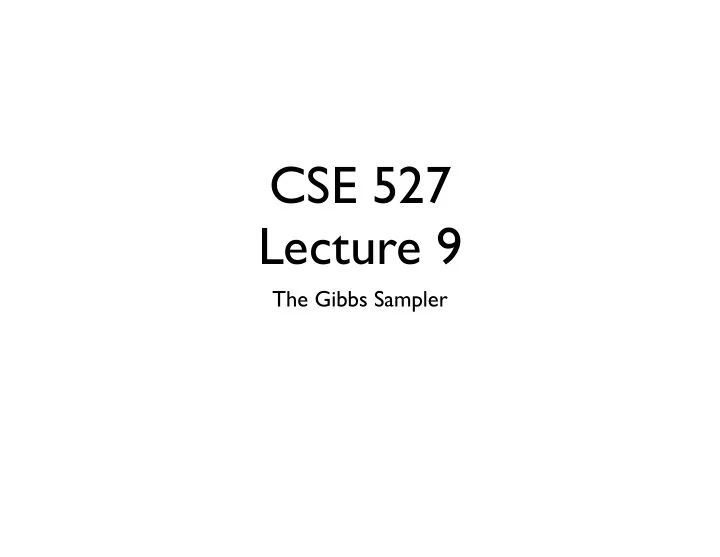

CSE 527 Lecture 9 The Gibbs Sampler
Talk Today • Zasha Weinberg Combi HSB K-069, 1:30 “Fast, accurate annotation of non-coding RNAs”
The “Gibbs Sampler” • Lawrence et al. “Detecting Subtle Sequence Signals: A Gibbs Sampling Strategy for Multiple Sequence Alignment” Science 1993
The Double Helix Los Alamos Science
Some DNA Binding Domains
Some History • Geman & Geman, IEEE PAMI 1984 • Hastings, Biometrika, 1970 • Metropolis, Rosenbluth, Rosenbluth, Teller, & Teller, “Equations of State Calculations by Fast Computing Machines,” J. Chem. Phys. 1953 • Josiah Williard Gibbs, 1839-1903, American physicist, a pioneer of thermodynamics
How to Average • An old problem: • n random variables: x 1 , x 2 , . . . , x k • Joint distribution (p.d.f.): P ( x 1 , x 2 , . . . , x k ) • Some function: f ( x 1 , x 2 , . . . , x k ) • Want Expected Value: E ( f ( x 1 , x 2 , . . . , x k ))
How to Average E ( f ( x 1 , x 2 , . . . , x k )) = � � � f ( x 1 , x 2 , . . . , x k ) · P ( x 1 , x 2 , . . . , x k ) dx 1 dx 2 . . . dx k · · · • x 1 x 2 x k • Approach 1: direct integration (rarely solvable analytically, esp. in high dim) • Approach 2: numerical integration (often difficult, e.g., unstable, esp. in high dim) • Approach 3: Monte Carlo integration sample and average: x (1) , � x (2) , . . . � x ( n ) ∼ p ( � x ) � � n x )) ≈ 1 x ( i ) ) E ( f ( � i =1 f ( � n
Markov Chain Monte Carlo (MCMC) • Independent sampling also often hard, but not required for expectation X t +1 | � � • MCMC X t • Simplest & most common: Gibbs Sampling P ( x i | x 1 , x 2 , . . . , x i − 1 , x i +1 , . . . , x k ) • Algorithm for t = 1 to ∞ t+ 1 t for i = 1 to k do : x t +1 ,i ∼ P ( x t +1 ,i | x t +1 , 1 , x t +1 , 2 , . . . , x t +1 ,i − 1 , x t,i +1 , . . . , x t,k )
• Input: again assume sequences s1, ..., sk with one length w motif per sequence • Motif model: WMM • Parameters: Where are the motifs? for 1 <= i <= k, have 1 <= xi <= |si|-w+1 • “Full conditional”: to calc P ( x i = j | x 1 , x 2 , . . . , x i − 1 , x i +1 , . . . , x k ) build WMM from motifs in all sequences except i, then calc prob that motif in ith seq occurs at j by usual “scanning” alg.
Randomly initialize xi’s for t = 1 to ∞ for i = 1 to k discard motif instance from si; recalc WMM from rest Similar to for j = 1 ... |si|-w+1 MEME, but it would calculate prob that ith motif is at j: average over, rather than P ( x i = j | x 1 , x 2 , . . . , x i − 1 , x i +1 , . . . , x k ) sample from pick new xi according to that distribution
Issues • Burnin - how long must we run the chain to reach stationarity? • Mixing - how long a post-burnin sample must we take to get a good sample of the stationary distribution? (Recall that individual samples are not independent, and may not “move” freely through the sample space.)
Variants & Extensions • “Phase Shift” - may settle on suboptimal solution that overlaps part of motif. Periodically try moving all motif instances a few spaces left or right. • Algorithmic adjustment of pattern width: Periodically add/remove flanking positions to maximize (roughly) average relative entropy per position • Multiple patterns per string
Recommend
More recommend